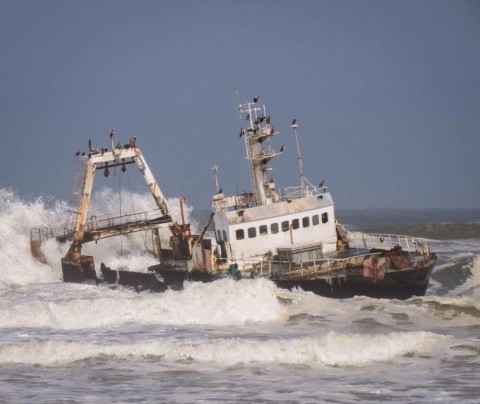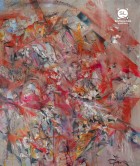Ruby is a wreck. She lives in the Thames. Trout fish through her bilge tanks, turds flush past her decks.
Once, men lived inside her and plotted inky maps they could travel through; stargazed above her into Africa, to white beaches striped with zebra, sea-pigs singing, kraken rolling in the sand.
Now Ruby is lodged in a sludge of London slurry.
She is snapped, her skull six metres down, tiding with gravel. Her gut gurgling coke cans and Primark, plastic dental floss sticks, dead cats.
Her spine rests deep in the ice age, on a clam-fossil terrace, mainmast to mizzenmast knotting with eels.
In cold currents, she cracks, sends splinters of herself off to sea.
July
Heatwave crabs into her portholes. The sun rises hotter every day.
As water levels drop, life clings sharp into claw.
Booze Cruises crown above her, mirror-balling karaoke, howl and vomit.
The river concentrates, and falls.
Ruby feels the world drop around her.
Once she was one hundred oaks strong, a bound forest breeze.
The ocean was her throne. She was the Queen.
August
Kids throw rocks at her exposed timbers.
Archaeologists come by, with cameras and computers and axes and saws, to measure and record, diagnose, categorise — when was she born? 1698. What sunk her? Accidental gunpowder ignition, three hundred crew dead.
They bulletin her for news, take photos of femurs, and grin.
They pirate away test tubes of medieval woodworm, winch off lumps of her skeleton with a crane, slice her up further on land.
Can anything be salvaged?
Only worms.
Her lower decks are too deeply submerged.
Nothing of note.
Not worth digging up, bringing in.
They declare her a graveyard.
A wreck is a wreck, the sea is a grave, of things too far gone.
The Thames is liquid history, says an official, to a shoal of skittish camera crew.
The City council goes back to their air-con, to the next thing on the list — a hoard of Iron Age spearheads found in Croydon by the Co-Op.
September
Three more weeks of heatwave.
Ruby stays inside darkness, half-buried in herself.
Each night, sand storms bite her skin, lick more of Ruby out the ground.
Squalls expose her buried belly. Tangle out fresh Ruby, tender, wet and raw.
The cold planets travel.
She wheezes sandpaper breaths, sneezes forecastle, orlop and rudder.
Her head feels like Egypt. Fried stale chickpeas, and old cats in a temple; bright eyes, a slinky mass of paw and hook.
Thick salty breaths sea shanty through her. She is too still. A sweat. She has been here too long.
Today
Beneath the stars over London, everything sleeps.
Except, two screams.
Laughter.
Singing. A smash of broken glass.
Streetlights blink orange. Two girls, drunk. Full to the brim, voices running home from a party, laddering down banks pulling off stilettos, light sequins, herons on the shore. Mud larking, palms clutching clay pipes and vodka, blue swirls of pottery, pockets full of bones.
And there are men.
Ruby listens.
Two men.
Come closer thinks Ruby, a little closer.
Sand-lice burrow in her marrow, a red sluggy crunch keeling in her bones.
The girls step forward, fleet prints down the river bed.
Ruby feels their naked footsteps in the mud. Feels their eyes distracted, on her body — feels the men gain.
Shift.
Cutlass, curve, pounce.
The girls careening, capsize.
And Ruby shifts with them.
Her bones snap.
Bats explode into gulls; silent sonar turns to shrieks.
In India, they filled Ruby with stolen gold. In Cyprus and Egypt, turquoise stones and eye-studded thrones. In Africa, women.
Ruby opens her chest.
Breaks her heart open, her belly full of blood.
A crack of ribs, a cough of rotten calf skins. A dozen empty Hogsheads tumble, cannonball moans.
The sand spills full of tarnish, glitter and snail.
The men turn to look, unzipped.
Ruby stares back, hard, solid gold, and both the men come.
They shove fists of emeralds in their pockets, gold coins inside their wallets, one swallows a diamond, big as a plum.
The other takes photos with his iPhone, then steals it away, precious with text messages, and a 30-Gig cache of Tinder history.
The men grab at the girls, wonder how much more they can take.
More, they decide.
More.
They shove sapphires down the girls’ bras, thrust pearls inside their mouths, ram rubies fat as rats down their Spanx.
Ruby breaks open her last chest.
Gold goblets, goitering stones.
She spits out her teeth.
They take and take and take her. And still, the men kick at her neck, looking for more.
The girls lie still, vodka shots between them.
They stare into each other, necks bruised ruby red.
Police? One mouths.
No, nods the other.
No.
No one will care.
No one will listen.
But Ruby listens.
Ruby stretches.
Feels the tides turn under her, the ocean Septembering – remembering, how when she was young she had been empty and nothing made her full, no journey was the end. The oceans pool back into her cold empty spaces.
Sand turns under her, futtocks, grips, a kedge and pivot.
A rattle of grit over bone.
A gurgle, a chug, a flood.
Quicksand.
Ruby kicks.
Bites, at the girls, cracks ankles, pulls wet bog from under them, and hisses, RUN.
The two girls sprint, screaming, rubies dripping down their thighs.
The two men, she swallows whole.
Two men, gone. A thousand dick–pics under the sea.
Now
The girls wake eight hours later, home, in bed — there is blood between their toes. Scratches in their pants. Mud in their pubes.
They drink coke, take codeine.
They lie close, taste iron, mizzenmast limbs. They talk about shipwrecks. Zebra, hogshead, and thrones.
They feel in their pockets, find bones.
____________________
Listen to the author read ‘Liquid History’.

Notes from Guest Reader Zach Powers
Who doesn’t love a story about a vengeful shipwreck? But what caught my attention in Elisabeth’s writing is how she incorporates the terminology of sailing and shipbuilding, and how that terminology creates a prose style that exists only within the confines of her particular story. She takes a strange and brilliant concept and uses that to push the bounds of language itself. She doesn’t ignore plot, though, tying the word-building and wordplay together with a deft, human-scale narrative at the end.


 The SmokeLong Grand Micro Contest (The Mikey) is now an annual competition celebrating and compensating the best micro fiction and nonfiction online.
The SmokeLong Grand Micro Contest (The Mikey) is now an annual competition celebrating and compensating the best micro fiction and nonfiction online.